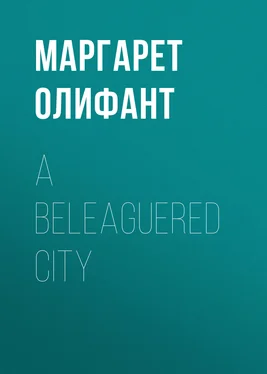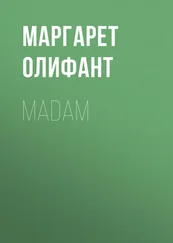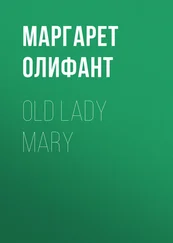Маргарет Олифант - A Beleaguered City
Здесь есть возможность читать онлайн «Маргарет Олифант - A Beleaguered City» — ознакомительный отрывок электронной книги совершенно бесплатно, а после прочтения отрывка купить полную версию. В некоторых случаях можно слушать аудио, скачать через торрент в формате fb2 и присутствует краткое содержание. Жанр: foreign_sf, literature_19, foreign_antique, foreign_prose, на английском языке. Описание произведения, (предисловие) а так же отзывы посетителей доступны на портале библиотеки ЛибКат.
- Название:A Beleaguered City
- Автор:
- Жанр:
- Год:неизвестен
- ISBN:нет данных
- Рейтинг книги:5 / 5. Голосов: 1
-
Избранное:Добавить в избранное
- Отзывы:
-
Ваша оценка:
- 100
- 1
- 2
- 3
- 4
- 5
A Beleaguered City: краткое содержание, описание и аннотация
Предлагаем к чтению аннотацию, описание, краткое содержание или предисловие (зависит от того, что написал сам автор книги «A Beleaguered City»). Если вы не нашли необходимую информацию о книге — напишите в комментариях, мы постараемся отыскать её.
A Beleaguered City — читать онлайн ознакомительный отрывок
Ниже представлен текст книги, разбитый по страницам. Система сохранения места последней прочитанной страницы, позволяет с удобством читать онлайн бесплатно книгу «A Beleaguered City», без необходимости каждый раз заново искать на чём Вы остановились. Поставьте закладку, и сможете в любой момент перейти на страницу, на которой закончили чтение.
Интервал:
Закладка:
‘Oh!’ he said, ‘I am called visionary. I am not supposed to be a trustworthy witness. Nevertheless, if M. Le Maire will come with me, I will show him something that is very strange—something that is almost more wonderful than the darkness—more strange,’ he went on with great earnestness, ‘than any storm that ever ravaged Burgundy.’
‘That is much to say. A tempest now when the vines are in full bearing—’
‘Would be nothing, nothing to what I can show you. Only come with me to the Porte St. Lambert.’
‘If M. le Maire will excuse me,’ said M. Barbou, ‘I think I will go home. It is a little cold, and you are aware that I am always afraid of the damp.’ In fact, our coats were beaded with a cold dew as in November, and I could not but acknowledge that my respectable colleague had reason. Besides, we were close to his house, and he had, no doubt, the sustaining consciousness of having done everything that was really incumbent upon him. ‘Our ways lie together as far as my house,’ he said, with a slight chattering of his teeth. No doubt it was the cold. After we had walked with him to his door, we proceeded to the Porte St. Lambert. By this time almost everybody had re-entered their houses. The streets were very dark, and they were also very still. When we reached the gates, at that hour of the night, we found them shut as a matter of course. The officers of the octroi were standing close together at the door of their office, in which the lamp was burning. The very lamp seemed oppressed by the heavy air; it burnt dully, surrounded with a yellow haze. The men had the appearance of suffering greatly from cold. They received me with a satisfaction which was very gratifying to me. ‘At length here is M. le Maire himself,’ they said.
‘My good friends,’ said I, ‘you have a cold post to-night. The weather has changed in the most extraordinary way. I have no doubt the scientific gentlemen at the Musée will be able to tell us all about it—M. de Clairon—’
‘Not to interrupt M. le Maire,’ said Riou, of the octroi , ‘I think there is more in it than any scientific gentleman can explain.’
‘Ah! You think so. But they explain everything,’ I said, with a smile. ‘They tell us how the wind is going to blow.’
As I said this, there seemed to pass us, from the direction of the closed gates, a breath of air so cold that I could not restrain a shiver. They looked at each other. It was not a smile that passed between them—they were too pale, too cold, to smile but a look of intelligence. ‘M. le Maire,’ said one of them, ‘perceives it too;’ but they did not shiver as I did. They were like men turned into ice who could feel no more.
‘It is, without doubt, the most extraordinary weather,’ I said. My teeth chattered like Barbou's. It was all I could do to keep myself steady. No one made any reply; but Lecamus said, ‘Have the goodness to open the little postern for foot-passengers: M. le Maire wishes to make an inspection outside.’
Upon these words, Riou, who knew me well, caught me by the arm. ‘A thousand pardons,’ he said, ‘M. le Maire; but I entreat you, do not go. Who can tell what is outside? Since this morning there is something very strange on the other side of the gates. If M. le Maire would listen to me, he would keep them shut night and day till that is gone, he would not go out into the midst of it. Mon Dieu! a man may be brave. I know the courage of M. le Maire; but to march without necessity into the jaws of hell: mon Dieu! ’ cried the poor man again. He crossed himself, and none of us smiled. Now a man may sign himself at the church door—one does so out of respect; but to use that ceremony for one's own advantage, before other men, is rare—except in the case of members of a very decided party. Riou was not one of these. He signed himself in sight of us all, and not one of us smiled.
The other was less familiar—he knew me only in my public capacity—he was one Gallais of the Quartier St. Médon. He said, taking off his hat: ‘If I were M. le Maire, saving your respect, I would not go out into an unknown danger with this man here, a man who is known as a pietist, as a clerical, as one who sees visions—’
‘He is not a clerical, he is a good citizen,’ I said; ‘come, lend us your lantern. Shall I shrink from my duty wherever it leads me? Nay, my good friends, the Maire of a French commune fears neither man nor devil in the exercise of his duty. M. Paul, lead on.’ When I said the word ‘devil’ a spasm of alarm passed over Riou's face. He crossed himself again. This time I could not but smile. ‘My little Riou,’ I said, ‘do you know that you are a little imbecile with your piety? There is a time for everything.’
‘Except religion, M. le Maire; that is never out of place,’ said Gallais.
I could not believe my senses. ‘Is it a conversion?’ I said. ‘Some of our Carmes déchaussés must have passed this way.’
‘M. le Maire will soon see other teachers more wonderful than the Carmes déchaussés,’ said Lecamus. He went and took down the lantern from its nail, and opened the little door. When it opened, I was once more penetrated by the same icy breath; once, twice, thrice, I cannot tell how many times this crossed me, as if some one passed. I looked round upon the others—I gave way a step. I could not help it. In spite of me, the hair seemed to rise erect on my head. The two officers stood close together, and Riou, collecting his courage, made an attempt to laugh. ‘M. le Maire perceives,’ he said, his lips trembling almost too much to form the words, ‘that the winds are walking about.’ ‘Hush, for God's sake!’ said the other, grasping him by the arm.
This recalled me to myself; and I followed Lecamus, who stood waiting for me holding the door a little ajar. He went on strangely, like—I can use no other words to express it—a man making his way in the face of a crowd, a thing very surprising to me. I followed him close; but the moment I emerged from the doorway something caught my breath. The same feeling seized me also. I gasped; a sense of suffocation came upon me; I put out my hand to lay hold upon my guide. The solid grasp I got of his arm re-assured me a little, and he did not hesitate, but pushed his way on. We got out clear of the gate and the shadow of the wall, keeping close to the little watch-tower on the west side. Then he made a pause, and so did I. We stood against the tower and looked out before us. There was nothing there. The darkness was great, yet through the gloom of the night I could see the division of the road from the broken ground on either side; there was nothing there. I gasped, and drew myself up close against the wall, as Lecamus had also done. There was in the air, in the night, a sensation the most strange I have ever experienced. I have felt the same thing indeed at other times, in face of a great crowd, when thousands of people were moving, rustling, struggling, breathing around me, thronging all the vacant space, filling up every spot. This was the sensation that overwhelmed me here—a crowd: yet nothing to be seen but the darkness, the indistinct line of the road. We could not move for them, so close were they round us. What do I say? There was nobody—nothing—not a form to be seen, not a face but his and mine. I am obliged to confess that the moment was to me an awful moment. I could not speak. My heart beat wildly as if trying to escape from my breast—every breath I drew was with an effort. I clung to Lecamus with deadly and helpless terror, and forced myself back upon the wall, crouching against it; I did not turn and fly, as would have been natural. What say I? did not! I could not! they pressed round us so. Ah! you would think I must be mad to use such words, for there was nobody near me—not a shadow even upon the road.
Читать дальшеИнтервал:
Закладка:
Похожие книги на «A Beleaguered City»
Представляем Вашему вниманию похожие книги на «A Beleaguered City» списком для выбора. Мы отобрали схожую по названию и смыслу литературу в надежде предоставить читателям больше вариантов отыскать новые, интересные, ещё непрочитанные произведения.
Обсуждение, отзывы о книге «A Beleaguered City» и просто собственные мнения читателей. Оставьте ваши комментарии, напишите, что Вы думаете о произведении, его смысле или главных героях. Укажите что конкретно понравилось, а что нет, и почему Вы так считаете.












